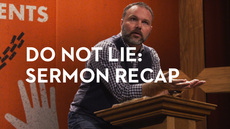“You shall not bear false witness against your neighbor.” Exodus 20:16
Have you ever been put on the spot and, in fear, told a lie? Maybe you’ve wanted to save face in front of peers or avoid rejection from your spouse.
Common phrases for bearing false witness include “tell a little white lie,” “fudge the numbers,” “stretching the truth,” or “omitting facts.” Whatever we call it, whatever the severity of the lie, to bear false witness is to lie about the God we represent.
Everything Christians do and say should always bear “witness” to the truth. Christians are representatives of Jesus who, at every opportunity, ought to show others the exact representation of the God who is truth (Heb. 1:3; Jn. 14:6). Believers speak the truth with their mouths, and they testify to that truth by living in response to the truth of who God is and what he has done for sinners.
Observation
- What are some ways Christians commonly bear false witness to the gospel beyond just telling lies with their mouths?
- What other commandments are violated when we “bear false witness”?
Interpretation
- Colossians 3:9–10 is a reminder of the tenth commandment. What additional information here gives fresh hope for believers today?
- Proverbs 6:16–23 tells us that lying is one of the things the Lord hates, and then it goes on to tell us how to safeguard against this sin. How do we do that?
- According to Ephesians 4:15, as believers grow in grace, how are they to speak to one another?
- Read 1 Corinthians 13:4–7. When love is present in the life of a believer, how does it respond to truth?
Application
- In Psalm 5:8–10, the psalmist says that his enemies “flatter with their tongue.” Are you ever tempted to be less than truthful to flatter either yourself or someone else? Why? Have you considered that this is sin? How could you respond differently in those situations to remain truthful and loving?
- Jesus told his disciples that they would be set free by the truth (Jn. 8:31–32). Ask the Lord to reveal to you any lies you may believe or lies you have told.
- If you have ever despaired of being able to accurately determine truth from lie, you can praise God. God not only delights in the truth, he is truth. Read Psalm 51:5–7, and make it a prayer of your own.
- Perhaps you have been so hurt by lies that it is hard for you to trust your heavenly Father to be truthful to you always. Read 2 Samuel 22, a song of praise written by David to God after God rescued him. David knew that “the word of the Lord proves true.”
This devotion is adapted from the Ten Commandments Study Guide.















